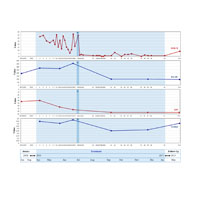Extending Blatt’s two-polarity model of personality development to dissociative identity disorder: a theory-building case study

Submitted: October 20, 2020
Accepted: March 24, 2021
Published: March 31, 2021
Accepted: March 24, 2021
Abstract Views: 2701
PDF: 1021
HTML: 37
HTML: 37
Publisher's note
All claims expressed in this article are solely those of the authors and do not necessarily represent those of their affiliated organizations, or those of the publisher, the editors and the reviewers. Any product that may be evaluated in this article or claim that may be made by its manufacturer is not guaranteed or endorsed by the publisher.
All claims expressed in this article are solely those of the authors and do not necessarily represent those of their affiliated organizations, or those of the publisher, the editors and the reviewers. Any product that may be evaluated in this article or claim that may be made by its manufacturer is not guaranteed or endorsed by the publisher.
Similar Articles
- Katharina T.E. Morken, Morten Øvrebø, Charlotte Klippenberg, Therese Morvik, Elisabeth Lied Gikling, Antisocial personality disorder in group therapy, kindling pro-sociality and mentalizing , Research in Psychotherapy: Psychopathology, Process and Outcome: Vol. 25 No. 3 (2022): SPECIAL ISSUE: "Group psychotherapy: between settled benchmarks and new horizons"
- Shirzad Babaei, Mahmood Dehghani, Fahimeh Fathali Lavasani, Ahmad Ashouri, Leila Mohamadi, The effectiveness of short-term dynamic/interpersonal group therapy on perfectionism; assessment of anxiety, depression and interpersonal problems , Research in Psychotherapy: Psychopathology, Process and Outcome: Vol. 25 No. 3 (2022): SPECIAL ISSUE: "Group psychotherapy: between settled benchmarks and new horizons"
- Meltem Yilmaz, Kutlu Kağan Türkarslan, Ludovica Zanini, Dilara Hasdemir, Grazia Fernanda Spitoni, Vittorio Lingiardi, Transference interpretation and psychotherapy outcome: a systematic review of a no-consensus relationship , Research in Psychotherapy: Psychopathology, Process and Outcome: Vol. 27 No. 1 (2024)
- Felix Brauner, Peter Fonagy, Chloe Campbell, Julia Griem, Timo Storck, Tobias Nolte, “Trust me, do not trust anyone”: how epistemic mistrust and credulity are associated with conspiracy mentality , Research in Psychotherapy: Psychopathology, Process and Outcome: Vol. 26 No. 3 (2023)
- Christopher B. Harte, Raymond C. Hawkins II, Impact of personality disorder comorbidity on cognitive-behavioral therapy outcome for mood and anxiety disorders: results from a university training clinic , Research in Psychotherapy: Psychopathology, Process and Outcome: Vol. 19 No. 2 (2016)
- Catalina Sieverson, Marcia Olhaberry, Javiera Duarte, Javier Morán-Kneer, Stefanella Costa, M. José León, Sofía Valenzuela, Fanny Leyton, Carolina Honorato, Antonia Muzard, Beyond the outcomes: generic change indicators in a video-feedback intervention with a depressed mother and her baby: a single case study , Research in Psychotherapy: Psychopathology, Process and Outcome: Vol. 25 No. 1 (2022)
- Marianella Abarzua, Francisco Venegas, Ximena Hidalgo, Subjective experience of diagnosis and treatment in two adolescents with first-episode schizophrenia , Research in Psychotherapy: Psychopathology, Process and Outcome: Vol. 19 No. 1 (2016): Special issue on Qualitative and Quantitative Research in Child and Adolescent Psychotherapy: part 2
- Linnea Nissling, Sandra Weineland, Kristofer Vernmark, Ella Radvogin, Anna-Karin Engström, Sara Schmidt, Eva Nieto Granberg, Elin Larsson, Timo Hursti, Effectiveness of and processes related to internet-delivered acceptance and commitment therapy for adolescents with anxiety disorders: a randomized controlled trial , Research in Psychotherapy: Psychopathology, Process and Outcome: Vol. 26 No. 2 (2023)
- Kelsey Armusewicz, Miriam Steele, Howard Steele, Anne Murphy, Assessing therapist and clinician competency in parent-infant psychotherapy: The REARING coding system (RCS) for the group attachment based intervention (GABI) , Research in Psychotherapy: Psychopathology, Process and Outcome: Vol. 25 No. 1 (2022)
- Giorgio Falgares, Giulia Costanzo, Giovanna Manna, Dorian A. Lamis, Childhood emotional maltreatment and internalizing problems in a non-clinical sample of adolescents: a moderated-mediation model of insecure anxious attachment style and gender , Research in Psychotherapy: Psychopathology, Process and Outcome: Vol. 27 No. 2 (2024)
<< < 1 2 3 4 5 6 7 8 9 10 > >>
You may also start an advanced similarity search for this article.

 https://doi.org/10.4081/ripppo.2021.505
https://doi.org/10.4081/ripppo.2021.505




